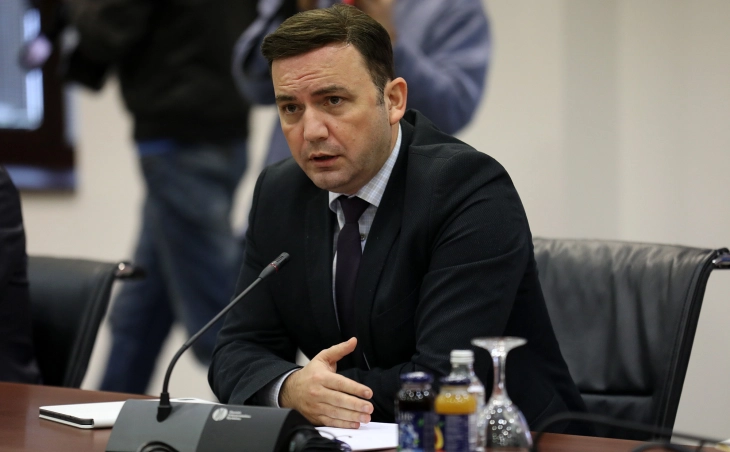Bulgaria issue crucial for MoFA in 2022, Osmani expects Petkov to visit Skopje in January

Skopje, 29 December 2021 (MIA) – Settlement of the Bulgaria dispute will be one of the key issues of the Ministry of Foreign Affairs (MoFA) in 2022. The focus will be on overcoming differences and starting EU accession negotiations, but there are many other priorities too, said Foreign Minister Bujar Osmani in his annual briefing on Wednesday.
FM Osmani expects the Government to be formed in mid-January, meaning that North Macedonia and Bulgaria will both have political governments for the first time in nine months.
“This is ad added reason for talks and overcoming of differences. Therefore, I expect Prime Minister Petkov to visit Skopje in January, so that we define the tempo and give predictability to the process in the coming period,” said Osmani.
According to him, the MoFA also has other priorities, such as the country’s NATO membership.
“We have to be actively engaged in NATO but we should also not forget that the country is entering the OSCE Chairmanship troika on January 1, ahead of our 2023 presidency,” added Osmani.
On the possibility of EU talks starting in June, the FM said the issue should not turn into a frozen conflict.
“I am working day by day, week by week, without giving lengthy timelines that would relax Skopje, Sofia and Brussels. I believe that we have deserved the accession negotiations and we should not leave any room for the issue to turn into a frozen conflict,” noted Osmani.
He stressed that imposing history as an EU accession criterion was an irrational approach.
“North Macedonia is recognized across the globe by the rights it ensures to citizens, both individual and collective. Therefore, if we speak about the right of a citizen regarding one’s viewpoints on history, or freedom to manifest cultural and identity attributes, the state shall provide this to all. But I believe that the approach of imposing history as a criterion, an agreement on an absolute truth of 100 or 70 years ago is not the path that two European countries and two NATO members should take as the only perspective for cooperation,” said Osmani.
He told the briefing that former Bulgarian FM Ekaterina Zaharieva had given a proposal for settlement of the Skopje-Sofia dispute in December 2020, but two provisions of that document were disputable for North Macedonia – the ones requiring the country to agree that the Macedonian language originates from the Bulgarian, while the nation from the struggle to break free from the Ottoman empire.
Osmani said the Portuguese EU Presidency proposal is still in force, not formally rejected by Bulgaria, and the only thing that North Macedonia can accept.
He said that North Macedonia is prepared to introduce the Bulgarian and Croatian communities in the Constitution by the time it joins the EU, adding that respect for human rights is the country’s biggest strength.
On the ministry’s activities in the past year, Osmani said they are working on the opening of a North Macedonia House in Brussels and a diplomatic business club in Skopje. He also noted the opening of passport-issuance stations in ten embassies, thus cutting waiting time from nine months to three weeks.
Regarding bilateral relations, Osmani said the United States is in the focus as the most important strategic partner, while highlighting Germany’s strong support to the Euro-integration process and trade cooperation.







